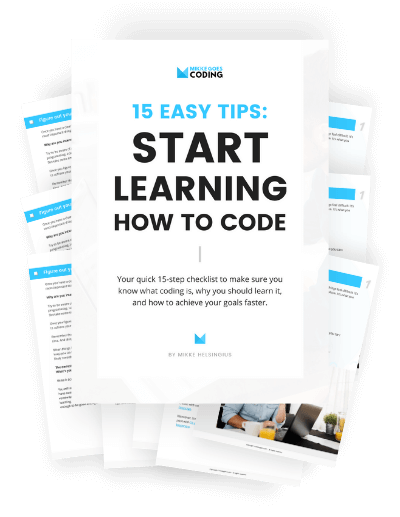Computer science is basically about solving problems. It’s about understanding what computers can do for you, whereas programming itself is the practice of making computers do those things.
Do you like solving problems? If that’s the case, computer science might just be your thing.
Learning CS and coding will require skills in logical thinking and solving problems in various ways. Of course, you will also need quite a bit of patience, too, for those days when things don’t go the way you planned.
Luckily, there are plenty of great resources available for learning computer science basics online. I’ll be sharing my favourite ones with you in this chapter.
But first, let’s start by looking at a few crucial reasons for learning CS to begin with.
Free Guide: Contents
- What is coding?
- Intro to programming languages
- Front-end and backend
- How does the Internet work?
- Useful tools for coding
- Computer science fundamentals
Why should you learn computer science?
What are CS skills good for with coding? If you’re just writing code for computer programs, why do you need to know what’s happening under the hood inside the computer?
Anyone without much knowledge in Computer Science will face quite a challenge when they start learning coding: they have to understand the terminology and dynamics around coding, which are closely related to the fundamentals of CS.
As I mentioned above, Computer Science is about understanding what computers can do for you and how they work. Knowing how your code actually works and is executed helps you write better, faster, and more efficient programs in the future.
Of course, when you’re just starting out by writing simple, one-file programs, worrying about writing perfectly efficient code is not your number one priority. However, the sooner you start being more aware of it, the easier it will be to learn the fundamentals of how to write “good” code in the long run.
“Learning coding without knowing much about CS is like learning how to drive but not knowing what happens when you turn the steering wheel.”
Since the more technical terms can sometimes become a bit overwhelming for a coding beginner, I’ve put together this chapter to get you started.
Understanding computer science helps you achieve your goals faster
When you start learning to code, you are bombarded with new technical terminology that gets your head spinning.
And if you are anything like me, you will spend tons of time looking for answers and explanations online.
That’s perfectly OK! We’ve all been there.
However, you can easily speed up your learning process by dedicating some time to learning computer science fundamentals before you start learning your first programming language.
Once you understand how computers work, you will feel more confident in writing your first programs and building projects on your own. Being familiar with the underlying technicalities of how computers “see” your code gives you a competitive advantage, too.
If you are just starting out with your tech journey, I strongly recommend taking a step back from your first coding course and learning at least a few fundamental concepts of computer science. It’s going to help you make progress faster in the long run, trust me.
For more details, check out my article on how computer science basics can help you learn to code faster.
Can you learn computer science while you learn to code?
Of course, everyone has a different way of learning. You might prefer to learn computer science basics while coding at the same time.
In fact, CS and coding overlap a lot in practice. Almost every computer science course includes practical exercises and small projects where you will apply your skills to writing code. So it’s not like you’d need to take a break from coding per se to learn CS.
My approach is simply a tip that worked for me and for hundreds of readers just like you.
Surely, you will learn the fundamentals of computer science along the way, eventually. But making an effort to understand them before really starting off with coding will speed things up later on, trust me.
Learning the basics of computer science right away will help you reach your goals with coding faster and more efficiently. You quite simply won’t get confused about terminology as often, saving you a lot of time.
Do I need to be good in math to learn computer science?
I’m often asked whether you need to be really good at math to become a programmer or in order to learn CS.
My answer is the same every time: it’s not about math at all.
Instead, it’s about the capability to understand how things work together. You know, understanding the bigger picture.
“Becoming good at coding is about being able to understand a specific problem and then working towards solving it in the best possible way.”
Hence, learning the basics of both computer science and coding will require skills in logical thinking and solving problems. You don’t necessarily need to be a math nerd. Knowing just basic arithmetics will get you far.
The best computer science courses for beginners
Ready to start learning? Awesome!
When it comes to finding a good computer science course for beginners, you want to start with the very basics.
Here are a couple of the best CS online courses to take a look at:
CS101 Bootcamp
CS101 Bootcamp is a short but extremely helpful beginner-level CS course on Udemy.
You don’t need any technical experience with computer science to start learning, so it’s perfect for newbies. As long as you know how to use the Internet, you’re all set.
During this course, you will write your own small programs and apps to practice your skills. You’ll learn how computer work on the inside, what software programming is all about, and much more. All this is packed into just 2 hours of intensive learning.

Computer Science 101
Computer Science 101 is a comprehensive and intensive computer science course for absolute beginners. If you are looking for the best all-in-one CS online course, I can’t recommend this one enough.
You will learn how to write more efficient programs from scratch. You will understand how to design your code so that it makes the most of the resources your computer offers. (And yes, I regret not having started this course any sooner…)

For more course recommendations, check out these top online computer science courses for beginners.
Final thoughts: Learning computer science fundamentals
All in all, understanding the basics of computer science is super helpful for anyone interested in learning to code.
When you start your first online coding course, you need to know what’s happening under the hood. You need to know to build your computer programs well so that they run fast on any device.
With the learning resources listed above, you can get a quick introduction to computer science. And even if it seems irrelevant at this point, it’s worth your time to get a basic understanding of it at this point.
What’s next?
In the next part of our guide, we’ll look at how you can choose the right programming language to learn.
Again, the guide is packed with heaps of helpful tips for helping you save time and achieve your coding goals faster. After all, if you want to start a career in tech, it only makes sense to pick a language with lucrative career opportunities, right?
Head over to the next part to find out which programming language to learn!

